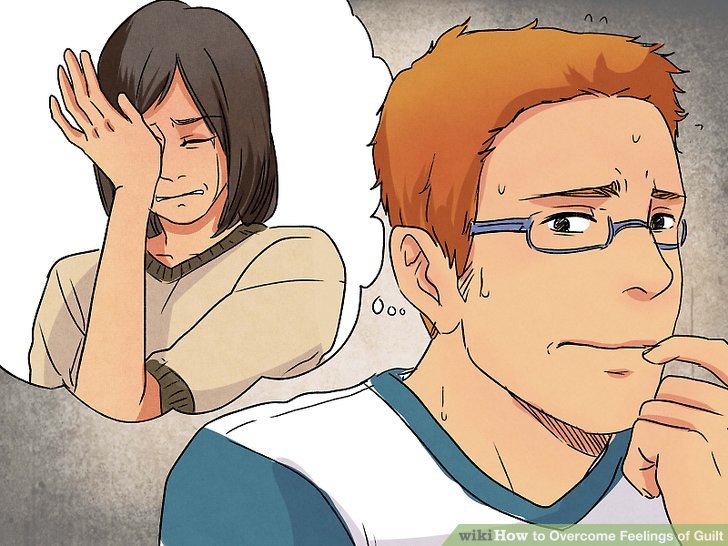- Study Says Most Parents Don’t Use Car Seats In Ride Share Vehicles Like Uber
- This 12-Year-Old Boy Is A Sophomore Aerospace Engineering Major!
- Fire Safety Experts Warn Of Hand Sanitizer Danger After A Mom and Kids Escape House Fire
- Recall Alert: Peaches May Be The Cause Of Salmonella Outbreak, 68 People Ill
- Summer Vacation In The Days Of COVID: Tips To Stay Safe
- How To Safely Grocery Shop During The Coronavirus Pandemic
- Michigan Teen With Vape-Related Illness Undergoes Double Lung Transplant
- Teen Kicks Off Anti-Vaping Campaign From Hospital Bed
- Teenager Receives Life Sentence For Strangling Sister To Death Over A Wi-Fi Password
- Toddler Falls To Death From 11th Deck of Cruise Ship
A Good Old Dose Of Guilt


Do you often feel guilty when it comes to your parent-child relationship?
Guilt is a complicated matter, perhaps you feel guilty because you took your child’s favorite toy away from them, or your child feels guilty for writing on your lovely walls.
The cycle of guilt is continuously turning, so don’t worry about feeling guilty sometimes.
In fact, a professor of psychology at the University of Toronto, who has studied the development of guilt in children especially, says that guilt is feeling like empathy.
Professor Tina Malti says “Moral guilt is healthy, good to develop. It helps the child refrain from aggression, antisocial behavior.” She uses the example of one child making another child cry. A child might have an empathic reaction because they feel bad for making someone else cry, or they might feel guilty for doing so because on a subconscious level they know the difference between right and wrong. “Those two reactions can be entirely independent, or can go together,” Malti says.
Guilt is a complex emotion and most children don’t understand the feeling of guilt until around the age of 6 and so Dr. Malti believes there is a developmental pathway for guilt. “There’s lots of evidence that healthy guilt promotes children’s prosocial behavior,” she said.
Dr. Helen Egger of NYU Langone Health said that guilt reflects what is known as “theory of mind”. “Children have to have developed a theory of mind, self and others, to be able to feel guilt. When you have lying or lack of guilt, the child seems to have a reduced capacity for empathy,” Egger says.
Guilt is a natural part of a child’s normal development and it’s healthy for a child to grow up with it, however, some would worry that they might grow to judge themselves too harshly. For example a child who might blame themselves for their parents fighting. We know that’s not a child’s fault but if they have strong feelings of guilt they may blame themselves.
Dr. Egger says that with younger children guilt can get mixed up with magical thinking and a sense of their own omnipotence.
Dr. Malti spoke about how parents can help their children to deal with, and to know what guilt is. She uses the term “induction”, whereby parents explain the consequences of actions to children very clearly. “Your sibling is crying, and this is because you have damaged his toy,” she says as an example.
She has worked with a lot of children during her time as a clinician and said that she has come across children who showed a lack of guilt and that induction can be very helpful. However, she has also worked with children who have been bogged down with ‘dysfunctional guilt’ and feel responsible for things well out of their control.
Dr. Malti said “If parents are fighting, it’s important to say how this is not related to the child’s behavior.” This can make a child worry unnecessarily and “this can lead to a more existential type of anxiety or depression,” she explains.
Colin Leach, a professor of psychology at the University of Connecticut said children need to be able to look at their own behavior and know what actually their responsibility is. “They have to have an accurate gauge. Feeling a little bad about it can motivate us, but retrospectively ruminating about where we’ve fallen short or being paralyzed by that tends not to be productive and tends to be really psychologically painful and harmful,” he explains.
It seems to fall back into the guilt cycle. Just like adults, some children are more inclined to negative thinking and blame themselves for almost everything while others shy away from blame altogether. “Sometimes children and adults don’t take enough responsibility, some blame themselves too much,” said Dr. Leach.
Dr. Helen Egger summed it all up nicely on how to educate children in the best way possible. She says that the most important developmental step for a child is “their capacity to know right and wrong, to behave in that right way, and when they don’t, to repair it with honestly and straightforwardness.”






0 comments